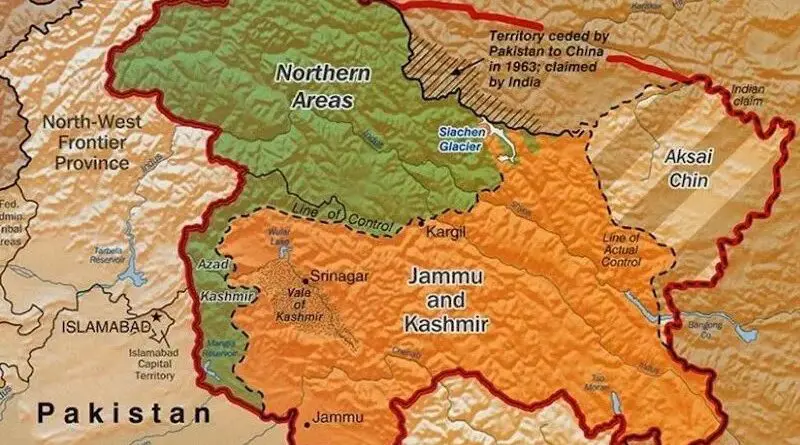India’s Growing Threats To Azad Kashmir And GB: Implications For Pakistan – OpEd
By Shaimin Raja
Under the leadership of the Bharatiya Janata Party (BJP), India has adopted an increasingly aggressive and assertive stance on the Kashmir issue, extending its ambitions to Gilgit-Baltistan (GB) as well. This shift from the relatively moderate policies of the Congress era to BJP’s unilateral moves is not only a clear violation of United Nations Security Council (UNSC) resolutions but also a strategic threat to Pakistan that demands serious attention.
The BJP’s strategy, rooted in anti-Pakistan and anti-Muslim rhetoric, has been instrumental in securing popular support since the 1980s. Landmark events like the Babri Mosque demolition and Advani’s Rath Yatra in the 1990s, and Modi’s post-Pulwama crisis rhetoric in 2019, have cemented the party’s hardline stance. Central to the BJP’s ideology is the assertion that Jammu and Kashmir is an integral part of India, a position it has aggressively pursued in its party manifestos and policies.
The revocation of Article 370 in 2019 marked a significant escalation in this approach. The BJP’s discourse shifted from merely discussing the revocation to making explicit threats about occupying Azad Kashmir and Gilgit-Baltistan. Prime Minister Modi and his cadre have projected India as a powerful, militarily robust, and civilizationally superior nation, driven by Hindu nationalist ideals. This belligerent outlook aims to bolster domestic electoral support by making aggressive decisions in both regional and international arenas.
The current Indian government’s stance is a stark deviation from previous efforts, such as those under Manmohan Singh and President Musharraf, to find peaceful solutions to the Kashmir conflict. The BJP’s aggressive policies not only contravene the UNSC resolutions but also threaten the stability of the region. Jammu and Kashmir, along with GB, remain disputed territories under international law, requiring resolution through mutual consent, not unilateral action.
The provocative statements from Indian officials under Modi’s leadership underscore this aggressive shift. Modi’s references to Azad Kashmir as part of India in various speeches, coupled with statements from other high-ranking officials like Defence Minister Rajnath Singh and External Affairs Minister S. Jaishankar, who have openly talked about gaining control over these regions, signal a clear and present danger. National Security Advisor Ajit Doval’s comments on India’s strategic needs concerning GB further illustrate this aggressive posture.
Indian media has also played a role in this escalating rhetoric. From a relatively subdued focus on the Kashmir issue before 2005, there has been a significant increase in aggressive discourse, with calls for unilateral actions to annex GB and counter Pakistan’s influence, often invoking proxy strategies. This shift in media narrative reflects and amplifies the government’s hardline stance, contributing to heightened tensions in the region. Pakistan’s response must be multifaceted and robust. Diplomatically, Pakistan needs to strengthen its narrative on the international stage, emphasizing the illegality and provocativeness of India’s actions. Engaging with key international players and organizations, including the UN, is crucial to garner support and highlight the potential for regional instability caused by India’s aggressive posturing.
Militarily, while Pakistan should remain committed to the peaceful resolution of disputes, it must also ensure its defenses are capable of deterring any potential aggressive moves by India. This includes maintaining a strong presence in Azad Kashmir and GB and conducting regular assessments of military readiness to respond to any provocations. Politically, Pakistan should consider granting provisional provincial status to GB, aligning with UNSC resolutions that allow for future determination of the region’s status through a plebiscite. This move would not only reinforce Pakistan’s commitment to the people of GB but also send a clear message to India about Pakistan’s determination to uphold its territorial integrity.
Economically, Pakistan should focus on the development and integration of Azad Kashmir and GB, improving infrastructure, education, and healthcare to ensure these regions are better connected and more resilient to external pressures. Economic development can also help in garnering local support and countering any attempts by India to destabilize the region. The international community also has a role to play in de-escalating tensions and ensuring compliance with international law. The United Nations, in particular, must reiterate its stance on the disputed status of Jammu and Kashmir and call for a peaceful resolution in accordance with its resolutions. Major powers, including the United States, China, and European countries, should use their influence to encourage dialogue and discourage unilateral actions that threaten regional peace.
In conclusion, India’s aggressive policies under the BJP towards Azad Kashmir and Gilgit-Baltistan are a significant concern for Pakistan. These actions not only destabilize the region but also violate UNSC resolutions. Pakistan must take strategic and diplomatic measures to counter this threat and ensure that its stance on Kashmir and GB remains robust and aligned with international law. The stakes are high, and Pakistan must act decisively to protect its territorial integrity and promote a peaceful resolution to this long-standing conflict.

